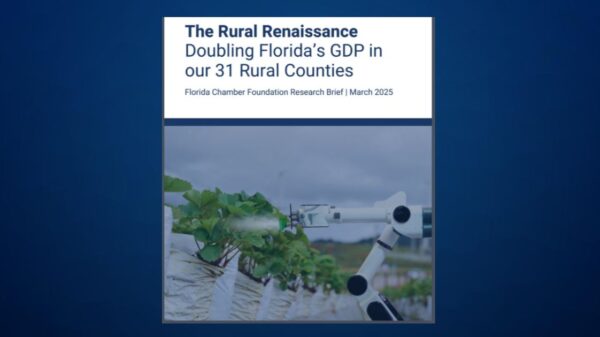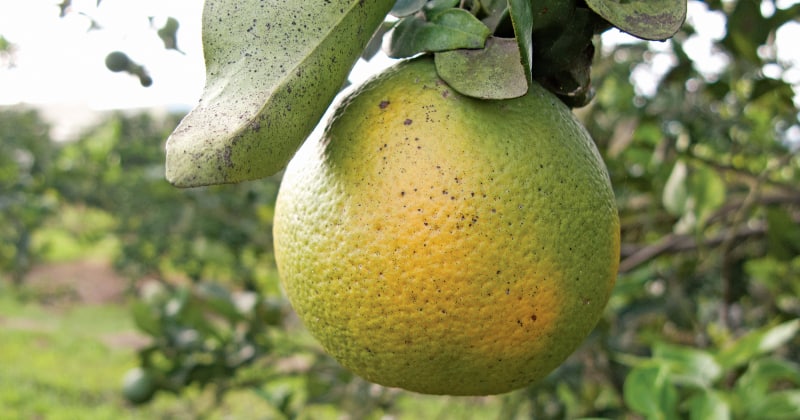Last week, the Florida Department of Agriculture and Consumer Services (FDACS) issued an alert regarding a virus found in Mexican tomatoes imported into the Sunshine State and potentially other states.
The tomato brown rugose fruit virus (ToBRFV) is, according to FDACS, “a highly virulent virus that can cause severe fruit loss in tomatoes and peppers” and imported tomatoes pose a threat to local tomatoes.
FDACS inspectors found infected products in packaged Mexican tomatoes in Naples and Gainesville.
Florida Agriculture Nikki Fried weighed in on the threat last week.

Nikki Fried
“For the past six months, our inspectors have been watching vigilantly for the ToBRFV virus, and are moving swiftly to prevent its introduction in our state,” said Fried. “Mexican-grown tomatoes carrying the ToBRFV virus are a serious threat to Florida, the nation’s leading producer of tomatoes and a $262 million industry in our state. We need the USDA to step up, initiate tracebacks to Mexican producers, and fulfill its responsibility to protect American growers and consumers.”
“These inspections were initiated after Division of Plant Industry virologists and plant pathologists conducted a risk analysis of ToBRFV. This was in response to concerns from Florida’s tomato industry, and is an example of our scientists and inspectors working together with growers to track significant agricultural diseases from around the world, and prevent their introduction to Florida,” said Dr. Trevor Smith, the director of the Division of Plant Industry.
“Florida is at high risk for the introduction of harmful invasive plant pests and diseases such as the brown rugose fruit virus found on tomatoes imported from Mexico. The spread of this virus would cause serious economic losses for Florida’s tomato producers, so we appreciate the vigilance of the Florida Department of Agriculture and Consumer Services in detecting it,” said Mike Joyner, the president of the Florida Fruit and Vegetable Association. “We also encourage consumers to support Florida farmers by buying produce labeled with the Fresh From Florida logo.”
The department offered Floridians the following information:
Symptoms: Tomatoes and peppers are the two major hosts for this virus, which causes yellowing of leaf veins, and yellow spots, brown rugose (wrinkled) patches, and necrotic (dead) lesions on tomato fruit. Symptoms in fruit develop within 12 to 18 days of infection.
Transmission: The ToBRFV virus can be easily transmitted by contaminated tools, hands, clothing, soil, and directly plant-to-plant, as the virus as highly stable. The virus may also be spread by pollinators like honeybees and bumblebees, which commonly pollinate tomatoes. The genetic resistance in tomatoes that protects against many tobamoviruses is not effective against ToBRFV.
Impacts: There are no known human health impacts from ToBRFV. However, the virus can cause 30-70 percent loss of tomato yield on plants, which may severely disrupt the domestic tomato industry. The virus may also make infected fruit less desirable to consumers, a concern for grocery retailers.
Prevention: Once the ToBRFV virus is introduced in an area, control measures are very limited. Prevention mainly relies on destroying infected plants and following strict decontamination measures for workers, such as sanitizing tools, frequent handwashing, and cleaning boots before entering greenhouses.
For Consumers: Tomatoes showing symptoms of ToBRFV infection are still safe for human consumption, but may appear less attractive than other tomatoes. The virus does not impact human health. Consumers are encouraged to select foods bearing the “Fresh From Florida” logo, which have been grown in Florida, not imported.
For Retailers: Grocers and retailers who suspect tomatoes in their inventories with ToBRFV infection should report the products to the Division of Plant Industry Helpline at 1-888-397-1517 or DPIHelpline@FDACS.gov.
The Florida Tomato Exchange (FTE), whose members make up 90 percent of tomato production in the state, weighed in at the end of last week and called on the U.S. Department of Agriculture (USDA) to take action.
“Multiple large-scale greenhouse operations in Mexico were confirmed to have shipped infected tomatoes to Florida,” the FTE noted. “ToBRFV can affect both tomatoes and peppers, causing severe yield reduction for growers and leading to quality defects that make fruit unmarketable. The contagion of this disease in the U.S. would be a crisis for American tomato and pepper growers and should not be taken lightly. Tomato growers around the world have been on high alert in recent years as ToBRFV, which originated in the Middle East, spread to Europe and Mexico. The virus is especially concerning because it can be transmitted by touch, meaning that it could be spread from infected fruit in the market to producer fields or greenhouses. Given the highly virulent nature of this disease, it is extremely concerning that infected tomatoes are being imported from Mexico to the U.S.”
The FTE maintained the USDA “must act swiftly to prevent this disease from spreading to American farms and greenhouses” and “should follow the lead of the European Commission, which voted in July to implement a quarantine status on ToBRFV in all EU member countries to help prevent the spread of the disease.” The FTE called on the USDA to enact a similar policy.
“USDA should immediately suspend the importation of tomatoes from any operation that is confirmed to have shipped infected tomatoes to the U.S.,” the FTE insisted. “Such suspension should only be lifted after USDA can confirm that the disease has been 100 percent eradicated from the operation in question. USDA should also significantly ramp up inspections for the virus on all imported tomatoes and peppers. Failure to take serious preventative measures will increase the risk that this disease will be introduced into tomato and pepper growing regions in the U.S., which would result in significant economic damage to American farmers”
Reach Kevin Derby at kevin.derby@floridadaily.com


















